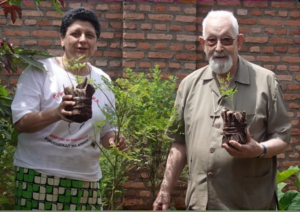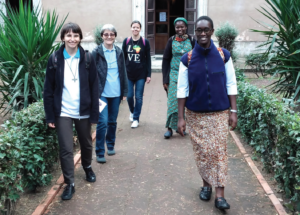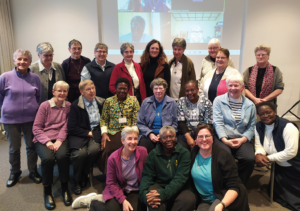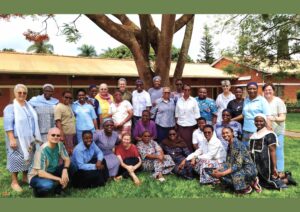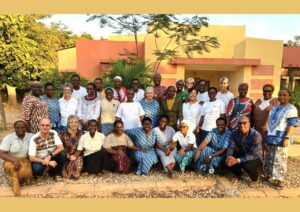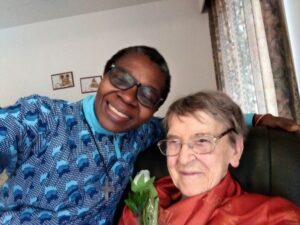Sr Leocadie Kana,
Msola community of Butare (Rwanda)
Kinteko, a subparish of the cathedral, is not far from our Butare community. Despite being close to the town, its population is very peripheral, with plenty of unemployed young people and many young single mothers. They are known to be very difficult and very poor materially, humanly and spiritually. Material poverty adds a heavy burden to the difficulties of family life which sometimes becomes hell. The first victims, the children, desert the family home while very young to live adventures in the city, turn to drugs , become criminals and an easy prey of human traffickers. The population of Kinteko is somehow left to itself. No religious was working in that area. Touched by this reality, our community reflected about it, and we decided to do something with the women and young people.
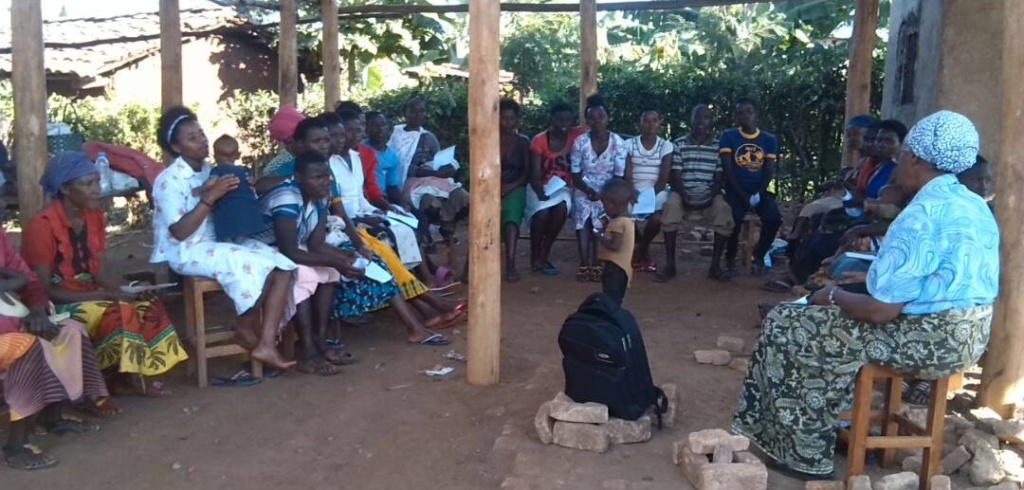
Leocadie began going to Kinteko regularly to get to know the context better. Her
desire was to discover and approach some existing groups of women and youth, to propose to walk with them on their journey, with the aim of a wakening them to values that could guide their life and actions, and to fight poverty. Today, ome values are slowly being integrated: solidarity in the fight against poverty, honesty, concern and respect for one another; welcoming and esteeming others in their differences; giving God a place in one’s life; opening up to others who live in difficult situations… To achieve this, Leocadie proposed encounters, prayers, recollections, celebrations… She invited outside persons to come into the milieu to give talks about marriage, family life, child education, solving family problems… She encouraged the youth to participate in recollections, to join people from other backgrounds with families where it is good to live, where parents are concerned to prepare a future for their children and thus protect them from human traffickers.
Little by little, the groups contacted are emerging from their poverty because living those values has led them to begin income-generating activities. They have begun to come out of being isolated, marginalized and peripheral.
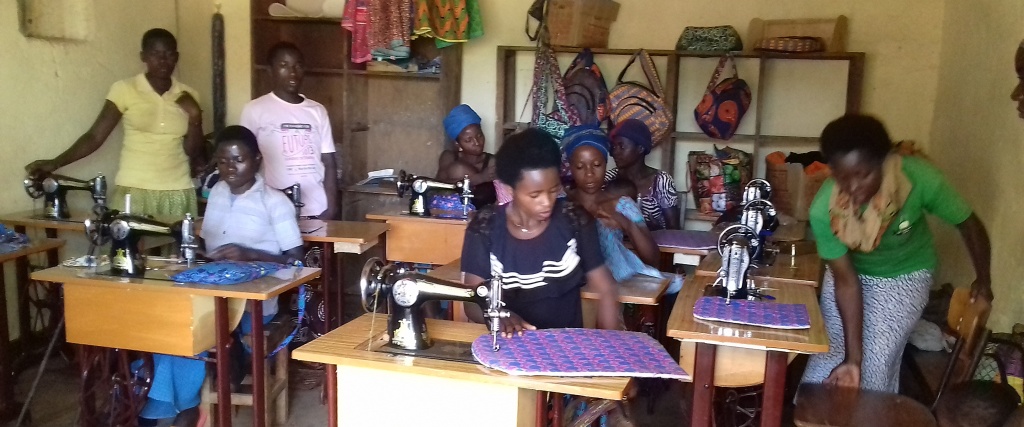
A committed papa from Kinteko community was touched by the idleness of the young people. So he met with them and offered classes: sewing for the girls and building for the boys. He paid the teachers out of his own pocket, even if his personal means are small. Unfortunately he has no time to be with them and those who are supposed to teach them do so in a way that leaves a lot to be desired.
Leocadie tells us more: I believe that when someone from the community takes the initiative to start something for the common good, it is very important to support him or her.
The first group of girls, trained before my arrival, either disappeared into the wilderness or left for the capital to look for work. From the 2nd and 3rd groups, which I accompanied, 24 young women have organized themselves and started a sewing workshop.
This young father is the Director of the place. I just give a helping hand for the supervision and accompaniment of the young people, so that with this small training, the girls especially can become self-sufficient materially and worthy of respect, no longer letting themselves be exploited by the first comer.
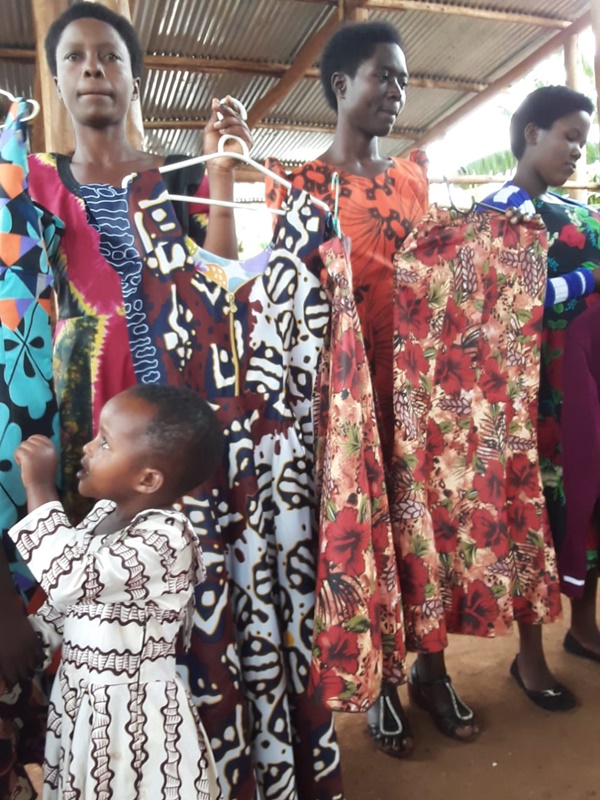
The place where I meet with the women is close to the one where these young people study. I noticed that things were not working well: absences, lack of discipline, insolence towards those who help them… I proposed to this papa to meet with these young people one afternoon per week, to accompany them, have discussions, invite them to meet with other young people, as is done in the youth Forums; to reflect with them on the diocesan theme for the youth; to share and reflect on the values which must guide their lives and actions, in order to profit as much as possible from the formation they are getting.
These small activities allow women and young girls to get some money to cover
their daily family needs. Some have individual activities: buying and reselling fruits and vegetables; cultivating for someone else for a small salary; making and selling sorgho juice; cultivating and selling mushrooms… There are also group activities, for example raising pigs. When there are small pigs, each member in turn receives one to raise on his/her own; when a pig is killed they make soap from the fat and sell the meat. They raise a cow and sell milk; young people do sewing. We start seeing some results and that encourages us to continue.
Now young people no longer go to the capital in search of adventure since they can study or learn a small trade at home.
Some who had gone to the capital have returned, especially girls; unfortunately, most of them come back pregnant. Some go back to school or learn a small trade that helps them get some income. Some girls even managed to get married. In this way they escape, or are better protected, against human traffickers.
Interaction between members of the Family Hope movement and the people of Kinteko
A few years ago I discovered a group of the “Family Hope” movement, whose members are well-off people: government officials, university teachers, wealthy businessmen, university students, etc. The members of this movement meet once a month for prayer, teaching, sharing, witnessing about their group work, and celebrating the Eucharist.
I talked to them about the population of Kinteko. I asked them if I could invite them to their recollections; they accepted. Today the first simple poor people in the Family Hope movement are those of Kinteko. All the rest live in
wealthy neighborhoods and have a fairly advanced Christian and spiritual life. I always participate in the meetings with a few members of the groups I accompany and with anyone from Kinteko who wants to attend. The interaction between the two groups is very positive for all of them.
These contacts open their eyes. They are struck by the fact that couples and families face similar difficulties whether they are poor or wealthy. Knowing one another opens them and motivates them to learn how to solve their own problems, how to prevent them, how to behave with children and how to better supervise and protect them.
The « Family Hope » movement has adopted the population of Kinteko which is really « peripheral ». A team had started monthly interventions in Kinteko, but the arrival of Covid – 19 abruptly stopped this. The target groups are mainly young people, but also adults, especially women. All highly appreciated the first intervention and have promised to sensitize others in their neighborhood. Those who came to speak were asked to return on a regular basis.


